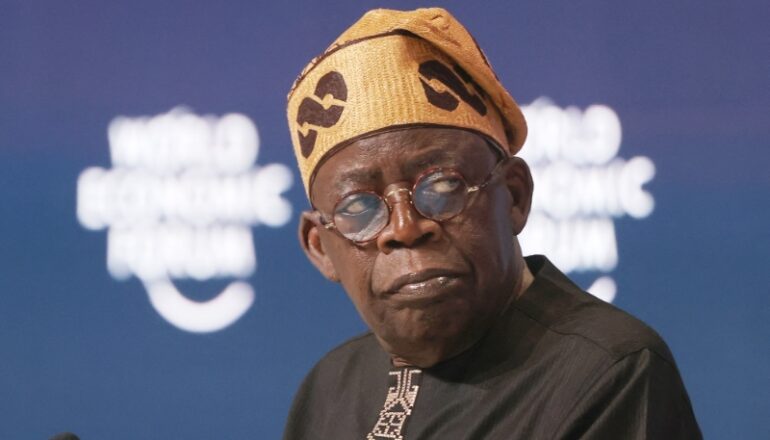President Bola Tinubu has reiterated that there is no turning back on the tax reform bills, emphasizing their critical role in modernizing Nigeria’s taxation system.
Speaking during a media chat in Lagos on Monday, Tinubu explained that these reforms were essential to eliminate outdated, colonial-era assumptions within the country’s tax environment. This marks Tinubu’s first Presidential Media Chat, which was broadcast on the Nigerian Television Authority (NTA) Monday night.
The proposed tax reforms have stirred significant controversy, prompting the House of Representatives to indefinitely suspend a scheduled debate on the bills originally set for December 3.
This decision followed intense pressure from the governors of the 19 northern states, who opposed the bills. Seventy-three northern lawmakers expressed their discontent, forcing the debate’s postponement.
While the tax reforms have found support in the South, where they are seen as steps toward fairer resource distribution, the northern opposition stems from concerns over perceived economic disadvantages and fears of marginalization.
Borno State Governor Babagana Zulum, in an interview with the BBC, questioned the urgency of the reforms, pointing out that the Petroleum Industry Bill took nearly two decades to pass. He called for careful consideration of the tax bills, warning they could disadvantage not only the North but also parts of the South.
On September 3, 2024, President Tinubu transmitted four tax reform bills to the National Assembly, based on recommendations from the Taiwo Oyedele-led Presidential Committee on Fiscal and Tax Reforms.
These include the Nigeria Tax Bill 2024, aimed at creating a new fiscal framework for taxation; the Tax Administration Bill, which seeks to establish a clear legal framework to reduce tax-related disputes; the Nigeria Revenue Service Establishment Bill, which will replace the Federal Inland Revenue Service Act and establish a new tax authority; and the Joint Revenue Board Establishment Bill, which will introduce a tax tribunal and ombudsman.
The northern governors have particularly opposed the Value Added Tax (VAT) distribution formula included in the reforms. On October 29, 2024, the Northern Governors Forum publicly rejected the bills, directing lawmakers from the region to vote against them. This was followed by a recommendation from the National Economic Council, led by Vice President Kashim Shettima, to withdraw the bills for broader consultations.
However, President Tinubu rejected this advice, asserting that the reforms are pro-poor, aimed at expanding the tax base, and addressing economic challenges.
Tinubu defended the tax reforms, asserting that they were long overdue and crucial for the country’s economic retooling. He noted, “We cannot continue with outdated methods in today’s economy.
These reforms are designed to widen the tax base and ensure a more equitable distribution of resources.” The President acknowledged the inevitable public outcry that often accompanies tax reforms but insisted that leadership requires making tough decisions for the long-term benefit of the nation.
When asked about the economic hardships following the removal of the fuel subsidy, Tinubu expressed no regrets, stating that the subsidy had been unsustainable and was draining the nation’s resources.
He argued that the subsidy had been a major financial burden, benefiting neighboring countries at Nigeria’s expense. “We were spending our future generations’ fortunes,” he said, adding that a phased subsidy removal was not a viable option, as it would only delay the inevitable financial reckoning.
The President also emphasized the importance of managing national resources prudently, urging Nigerians to live within their means and curb unnecessary expenditures. He criticized the idea of giving fuel subsidies to neighboring countries, describing it as reckless.
On the subject of his administration’s performance, Tinubu rejected calls to shrink his cabinet, arguing that Nigeria’s size and complexity necessitated a large team to ensure effective governance. He assured that his appointees were contributing positively and efficiently to their assigned roles.
Regarding the 2025 budget proposal, Tinubu expressed confidence that the goal of reducing inflation from 34% to 15% could be achieved by boosting local production and reducing reliance on imports. He emphasized the importance of investing in agriculture, manufacturing, and security to improve food production and ensure self-sufficiency.
The President also commented on recent tragic stampedes at events in Ibadan, Abuja, and Okija, which claimed the lives of 67 people, including 35 children. He blamed the disorganization of event organizers, stressing the need for better planning and discipline in society. He also pointed out that charity events should be carefully managed to avoid such tragedies.
Tinubu further highlighted his government’s anti-corruption efforts, including the removal of the subsidy, which he argued had helped curb smuggling of petroleum products. He noted that increased transparency and improved allocation of resources to states and local governments had helped combat corruption. He cited the discovery of hundreds of properties owned by former Central Bank Governor Godwin Emefiele as evidence of his administration’s commitment to tackling corruption.
On tackling corruption, the President stressed the importance of addressing its root causes, including poverty and lack of access to basic services. He pointed to his government’s efforts to raise wages, provide student loans, and increase transparency as key measures in reducing corrupt practices.
Finally, when asked about rising food prices, Tinubu reiterated his belief in increasing agricultural production rather than imposing price controls. He emphasized that government efforts would focus on boosting domestic supply to ensure that Nigeria can feed itself and even become an exporter of food.


